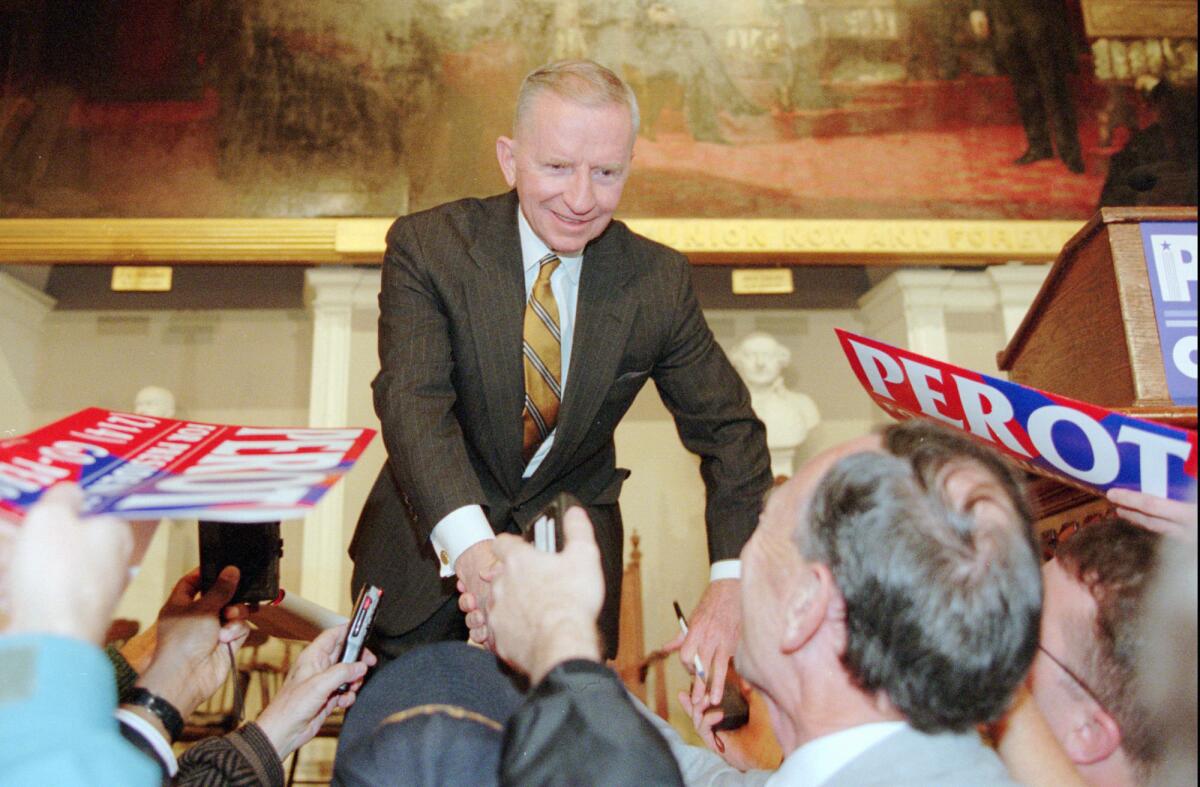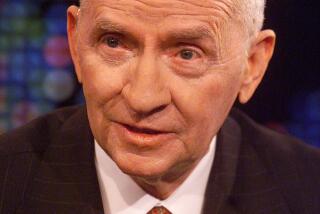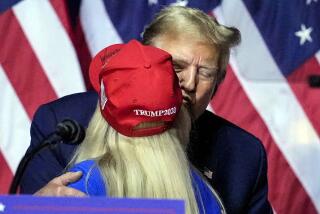Op-Ed: Donald Trump: Like Ross Perot, but worse for the GOP

Reform Party presidential candidate Ross Perot shakes hands with supporters following a speech at Faneuil Hall in Boston on Oct. 30, 1996. Although he didn’t win the presidency, Perot had a profound impact on the election and on the issues discussed.
2016 looks remarkably like 1992: an election with a Bush, a Clinton and an uncontrollable billionaire. The last time around the unscripted business mogul changed the nature of the campaign; this time he could cost the Republican Party the presidency.
Ross Perot entered the race in February 1992, taking on two unpopular opponents: Bill Clinton and George H.W. Bush. After leading through the entire month of June, he dropped out, dropped back in, and ultimately received the highest third-party vote share since 1912: a stunning 18.9%.
Perot’s traction with the electorate led Clinton and Bush to address issues — including the federal budget deficit — they might not have otherwise. His success also led then-Rep. Newt Gingrich to propose his Contract With America, a policy platform that ignored social issues in favor of political reform, including the sweeping changes to congressional process that have played a large part in the current gridlock.
But, contrary to popular belief, Perot was not responsible for Clinton’s victory. On election day, Perot supporters split right down the middle in their second choice. This fact shouldn’t really surprise anyone, because Perot’s appeal was nonpartisan. He promised to fix the mess both major parties had gotten the country into: unbalanced budgets, lost manufacturing jobs, a political process reserved for wealthy lobbyists. Sound familiar? Sound, specifically, like Donald Trump?
Trump, like Perot, is an equal-opportunity critic. But if he decides to run as an independent — a possibility he refused to rule out at the first Republican debate — he probably won’t have a Perot-like balanced effect on the contest.
A recent Washington Post/ABC poll shows that in a three-way race, Trump increases Hillary Rodham Clinton’s edge over Jeb Bush to 16 percentage points from 6 percentage points in a two-way race.
And according to a recent Rasmussen poll, 1 in 5 Republicans say they are “very likely” to vote for a Trump-led third-party effort, while less than 10% of Democrats say the same.
There is good reason, beyond polling data, to expect a Trump independent candidacy to hurt Republicans more than Democrats: his agenda. Trump’s signature issue is immigration. He, of course, favors a hard-line approach, insisting without evidence that the Mexican government is sending criminals across the border. Unlike Perot’s emphasis on trade and the deficit, which drew support from both Republicans and Democrats, Trump’s talking points exploit a deep division specific to the Republican Party.
A recent Pew survey found that a third of Republicans, and half of the most active Republicans, do not support any path to citizenship. A comprehensive immigration reform bill (which has passed in the Senate and which Speaker John Boehner says is a top priority for the House) would further alienate anti-immigration Republicans from their party and further reinforce Trump’s appeal to the conservative base.
With eight to 10 states up for grabs, and the Republican candidate quite possibly tethered to a comprehensive immigration reform bill — either Jeb Bush or Marco Rubio would have trouble shedding a pro-immigration reform reputation — a Trump independent candidacy could do real damage to the GOP. If Trump attracted even 5% of the vote, he could decide the election in Clinton’s favor. No wonder Republicans are worried.
Ronald B. Rapoport and Walter J. Stone are professors of political science at the College of William & Mary and UC Davis, respectively. They are the authors of “Three’s a Crowd: The Dynamic of Third Parties, Ross Perot, and Republican Resurgence.”
Follow the Opinion section on Twitter @latimesopinion and Facebook
More to Read
A cure for the common opinion
Get thought-provoking perspectives with our weekly newsletter.
You may occasionally receive promotional content from the Los Angeles Times.






